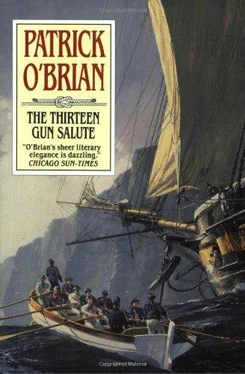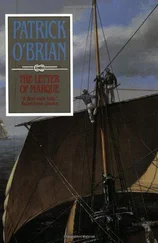Patrick O'Brian - The Thirteen Gun Salute
Здесь есть возможность читать онлайн «Patrick O'Brian - The Thirteen Gun Salute» весь текст электронной книги совершенно бесплатно (целиком полную версию без сокращений). В некоторых случаях можно слушать аудио, скачать через торрент в формате fb2 и присутствует краткое содержание. Жанр: Книги. Описание произведения, (предисловие) а так же отзывы посетителей доступны на портале библиотеки ЛибКат.
- Название:The Thirteen Gun Salute
- Автор:
- Жанр:
- Год:неизвестен
- ISBN:нет данных
- Рейтинг книги:4 / 5. Голосов: 1
-
Избранное:Добавить в избранное
- Отзывы:
-
Ваша оценка:
- 80
- 1
- 2
- 3
- 4
- 5
The Thirteen Gun Salute: краткое содержание, описание и аннотация
Предлагаем к чтению аннотацию, описание, краткое содержание или предисловие (зависит от того, что написал сам автор книги «The Thirteen Gun Salute»). Если вы не нашли необходимую информацию о книге — напишите в комментариях, мы постараемся отыскать её.
The Thirteen Gun Salute — читать онлайн бесплатно полную книгу (весь текст) целиком
Ниже представлен текст книги, разбитый по страницам. Система сохранения места последней прочитанной страницы, позволяет с удобством читать онлайн бесплатно книгу «The Thirteen Gun Salute», без необходимости каждый раз заново искать на чём Вы остановились. Поставьте закладку, и сможете в любой момент перейти на страницу, на которой закончили чтение.
Интервал:
Закладка:
He stood up as Stephen emerged from the trees, reaching the open grass before the temple, and came forward to welcome him. 'Will you take a cup of tea?' he asked, proper greetings having been exchanged.
Ordinarily Stephen took no great delight in that insipid wash, but the Thousand Steps had reduced his pride and he accepted most thankfully. As they walked back and mounted the narthex steps (oh so painfully) he observed that the mias was sitting on the other side of the brazier, not indeed on a stool like the monk's but in a kind of tilted basket-work nest.
Her feet had obviously been washed in a basin of warm water and there was blood on the cloth. Nevertheless the monk said, 'Muong, where are your manners?' and the ape rose high enough to bow.
Stephen returned the bow and said, 'Muong and I came up the Thousand Steps together.'
'Did she indeed go so far down as the durians?' asked the monk, shaking his head. 'I had supposed she was only walking on the higher slope for tilac berries. No wonder her poor feet are so torn. She too will be the better for a cup of tea.'
The ape had looked anxiously from face to face during this conversation; but at the word tea her visage brightened, and from the recesses of her basket she drew out a bowl.
While the monk, whose name was Ananda, was making the tea, and while they were all three drinking it, Stephen studied Muong's face; its varieties of expression were difficult to make out, but presently he could distinguish several, particularly the took of deep affection that she often directed towards the monk.
The chanting inside the temple stopped. The gong sounded three times. 'They are about to meditate,' observed Ananda.
Now night was coming fast. A final chorus of gibbons went hoo hoo hoo at great length in the forest below, and two of them hurried across the grass in front of the narthex, one with its hands clasped behind its neck, the other with its arms held high. The monk brought a lamp, and at once it lit up a mouse-deer and her tiny fawn. Muong's eyes had closed; she was wheezing comfortably.
'I am sorry that she went so far,' said Ananda. 'It is too much for an ape of her age.'
'Perhaps she is very fond of durians.'
'She is; but there are plenty here, and some are ripe. No. She goes down there to see a male orang-utang; but she is old, and he scorns her. She comes back tired and sad, her feet torn, her coat quite matted.'
'Are there no orang-utangs here?'
'Oh yes, plenty, plenty; but they will not do. The only one for her is that animal below. She is friendly with her cousins here; they visit her quite often; but none can be looked upon as a mate.'
They talked about her for some time, and it appeared that more years ago than he could remember - the count of years was lost up here - when Ananda was a newly-arrived novice he had found her, a suckling, her mother dead, presumably from a snake-bite, and he had brought her up on ewe's milk. She could not actually speak, but he was quite sure that she understood at least two hundred words and could follow the drift of any ordinary conversation. She was very affectionate in a quiet, gentle way; and if she had not been so tired that evening, Stephen would have seen that she had pretty manners - she always wiped her mouth after drinking, for example, and she could eat with a spoon.
At moon-rise Ananda brought him a bowl of cold brown rice with salted green durian as a relish, and when it was eaten asked him - the first personal question since they met - where he would like to sleep. The room above this had once been called the pilgrim-chamber, but that was very, very long ago and now the bats might be an inconvenience; yet on the other hand sleeping down here exposed one to serpents, who loved to share one's warmth, and to porcupines.
'If Muong does not dislike it,' said Stephen, who had seen her busily and very exactly spreading a square of litter at the far end, 'I am sure I shall not.'
He had always understood that nothing in the vast and effectively sacred Kumal crater was ever killed by men nor had been so killed since the beginning of the Buddhist era, yet although he had had some small experience of this immunity during his time in Hindu India, where vultures would sit on the roof or squabble in the busy street and where monkeys walked in at the window, he was astonished by what he saw. Before he went to sleep half the Ark, half the fauna of Pub Prabang walked by in the moonlight or sat scratching themselves on the broad expanse of grass. One in the night he was woken by a huge, sweet-breathed creature blowing on his face, but by that time the moon had set and he could not identify it; then in the early light, when first he raised his head, there was an orang-utang nonchalantly leaving the narthex, where it had presumably called on Muong. And the dewy grass was crisscrossed with innumerable tracks.
When next he sat up he observed that Muong had already left - her bedding was ranged neatly behind a row of stones - and that his legs were quite extraordinarily stiff. He rubbed them, listening vaguely to the chant within and watching the sun's light travel down the mountainside: the sky was already a full soft blue and the gibbons had been hooting this half hour and more. The light reached a noble tree that he took to be a liquidambar; the chant seemed to be moving to a close; he stood up, still bent, and felt in his roll for the offerings that Liu Liang (himself a Buddhist in the Chinese manner) had told him would be acceptable, a long thick silk-skinned sausage of delicate tea, a long thick leather-skinned sausage of benzoin. He washed his face in the remaining dew, pushed his roll into a shape at least as neat as Muong's, and sat on the narthex steps, eating a ship's biscuit.
The chanting stopped, the gong boomed and the door opened, a shaft of sunlight showing the great stone figure at the far end of the temple, a calm, harmonious figure with its right hand raised, palm outwards. The five choir-monks came out, led by their tall, lean abbot. Stephen bowed to them and they to Stephen. Ananda appeared with tea and several bowls.
Everyone sat on the ground, and Stephen proffered his silk parcel, saying, 'An unworthy offering to an ancient house,' and his leather parcel, 'To an ancient house, an unworthy offering.'
The abbot patted them with detached pleasure, returned thanks, and waited, drinking his tea, sip by sip After a decent interval Stephen gave a short account of himself he was a medical man, a naval surgeon, brought into these parts by the war between England and France; apart from medicine his greatest interest was living things and their way of life He also had a friend who was deeply concerned with the first spread of
Buddhism and the remaining early temples. Stephen therefore hoped he might be permitted to look at Kumai, measure it, draw it as far as his powers allowed, and to walk about the country for a few days to observe its inhabitants.
'Certainly you may look at our temple, and draw it,' said the abbot. 'But as for the animals, there is no killing here. We eat rice, fruit and such things; we take no life.'
'I have no wish to kill anything here; only to observe. I have no weapons at all.'
While the Abbot was considering this, another monk, who had been gazing at Stephen through his spectacles, said, 'So you are an Englishman.'
'No, sir,' said Stephen. 'I am an Irishman. But for the moment Ireland is subject to England, and therefore at war with France.'
'England and Ireland are small islands on the farthest western extremity of the world,' said another monk. 'They are so close together that they can scarcely be distinguished; birds flying at a great height may land on the one rather than on the other. But in fact England is the larger.'
'It is true that they are close together, and that it is not always easy to distinguish them from a great distance; but then, sir, the same applies to right and wrong.'
Читать дальшеИнтервал:
Закладка:
Похожие книги на «The Thirteen Gun Salute»
Представляем Вашему вниманию похожие книги на «The Thirteen Gun Salute» списком для выбора. Мы отобрали схожую по названию и смыслу литературу в надежде предоставить читателям больше вариантов отыскать новые, интересные, ещё непрочитанные произведения.
Обсуждение, отзывы о книге «The Thirteen Gun Salute» и просто собственные мнения читателей. Оставьте ваши комментарии, напишите, что Вы думаете о произведении, его смысле или главных героях. Укажите что конкретно понравилось, а что нет, и почему Вы так считаете.












